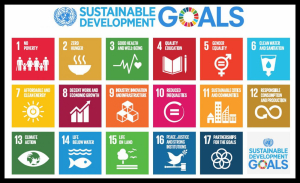Amid the Coronavirus Pandemic, the SDGs Are More Relevant Than Ever
 The world is dealing with a crisis of monumental proportions. The novel coronavirus is wreaking havoc across the globe, destroying lives and ruining livelihoods. The primary cost of the pandemic as calculated in the loss of human life is distressing, but the knock-on effects in terms of the global economy, people’s livelihoods, and sustainable development prospects are even more alarming. Indeed, the International Monetary Fund estimates that the global economy has already fallen into recession, and while the full economic impact of the crisis is difficult to predict, the ultimate cost is likely to be extraordinary and unprecedented.
The world is dealing with a crisis of monumental proportions. The novel coronavirus is wreaking havoc across the globe, destroying lives and ruining livelihoods. The primary cost of the pandemic as calculated in the loss of human life is distressing, but the knock-on effects in terms of the global economy, people’s livelihoods, and sustainable development prospects are even more alarming. Indeed, the International Monetary Fund estimates that the global economy has already fallen into recession, and while the full economic impact of the crisis is difficult to predict, the ultimate cost is likely to be extraordinary and unprecedented.
That is why we must all support the United Nations‘ call to scale up the immediate health response to the virus, with a particular focus on women, youth, low-wage workers, small and medium enterprises, the informal sector, and vulnerable groups who were already at risk. Working together we can save lives, restore livelihoods, and get the global economy back on track.
At the same time, the pandemic has utterly exposed fundamental weaknesses in our global system of governance and demonstrated beyond a shadow of a doubt how poverty, inadequate health systems, underresourced educational systems, and sub-optimal global cooperation can exacerbate a crisis like COVID-19. These are exactly the kinds of challenges the UN’s Sustainable Development Goals (SDGs) are meant to address.
The rapid spread of the virus has come at a time when the SDGs were beginning to get traction and a significant number of countries were making progress in implementing them. But with the world today consumed by the need to contain the virus and mitigate its many adverse and debilitating impacts, countries are resetting their priorities and reallocating resources to deal with the challenge.
Emerging evidence of the broader impact of the coronavirus crisis on efforts to achieve the SDGs should be troubling for all. UNESCO estimates that some 1.25 billion students globally have been affected by the pandemic, posing a serious challenge to the attainment of Sustainable Development Goal 4, while the International Labour Organization (ILO) projects that some 25 million people could lose their jobs over the coming months, dealing a serious blow to progress on Sustainable Development Goal 8 — and that is likely just the tip of the iceberg.
Crucially, in many parts of the world, the pandemic also is creating roadblocks to progress on clean water and sanitation targets (Goal 6), addressing pervasive inequality (Goal 10), and, perhaps most importantly, addressing the twin crises of global poverty (Goal 1) and hunger/food insecurity (Goal 2). Indeed, the World Bank estimates that pandemic will push an additional 11 million people into poverty.
In other words, what we cannot afford to do in this critical moment is to de-link the global response to the pandemic from action on the SDGs. Indeed, by continuing to make progress on the SDGs, we will be putting ourselves on a firmer path to dealing with global health risks and the emergence of new infectious diseases in the future. Achieving SDGs Goal 3, for instance, will mean that we succeeded in strengthening the capacity of countries to conduct early warning surveillance, reduce the risk of contagious pathogens from spreading, and manage the situation promptly and effectively should they be faced with such a situation.
As the global community strives to deal with the challenges posed by the pandemic, we must seek to turn the crisis into an opportunity and ramp up our actions to support and ultimately achieve the goals by 2030. The world has the knowledge and expertise to muster the full complement of resources needed to to do that. Buoyed by a spirit of solidarity, governments, businesses, multilateral organizations, and civil society have been able to raise and direct trillions of dollars to defeat the virus. We can do the same to defeat global poverty, reduce inequality, provide a quality education to all, protect the climate, and build a more just and sustainable global economy. All that is missing is the political will.
As governments, business, and civil society around the world respond to the impacts of the pandemic, it is incumbent on all of us to stay focused on the underlying factors that have exacerbated those impacts. We cannot relent in our efforts, even amid this painful pandemic, to address people’s basic needs, protect the beauty and diversity of our planet, and build a fairer and more just world. COVID-19 reminds us that we face common, global challenges that can only be solved through united, global action. In a crisis like this, we are only as strong as our weakest link.


